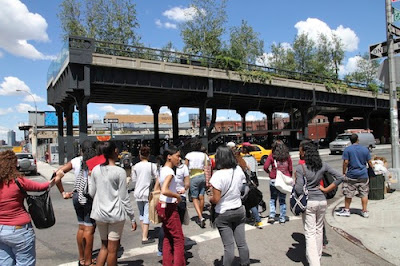 Rich Strum is the Director of Education at Fort Ticonderoga. For the past 13 years, Strum has responsible for all the educational activities at the Fort (including the 2,000 acres of landscape). His focus includes school programs, family programs, youth group (scouts) programs, seminars and conferences, workshops, college and university partnerships, and lecture programs.
Rich Strum is the Director of Education at Fort Ticonderoga. For the past 13 years, Strum has responsible for all the educational activities at the Fort (including the 2,000 acres of landscape). His focus includes school programs, family programs, youth group (scouts) programs, seminars and conferences, workshops, college and university partnerships, and lecture programs.
Fort Ticonderoga, America’s Fort, is a private not-for-profit historic site and museum along Lake Champlain that presents the struggles, sacrifices, and victories that shaped the nations of North America and changed world history.
New York History had the opportunity to do an email interview with Strum about his work at Fort Ticonderoga.
NYH: What is a challenge you face in your job?
RS: I think like all non-profits, the biggest challenge is maximizing limited resources to produce quality programs.
NYH: Tell us about the projects you’ve been working on this past year?
RS: Fort Ticonderoga has a strong reputation for hosting quality seminars and conferences. Our War College of the Seven Years’ War is entering its 17th year and the Seminar on the American Revolution is in its 9th year. In 2012, we’ve added three new seminar programs that reach out to new audiences: “Material Matters: It’s in the Details” is geared for collectors and others with an interest in 18th-century material culture. The First Annual “Garden & Landscape Symposium” complements our King’s Garden and reaches out to regional home gardeners. The “Conference on Lake George and Lake Champlain” takes a holistic view of these lakes, exploring the history, geography, culture, ecology, and current issues related to the region.
We are also expanding our scouting programs, building on our successful school programs to develop scout-specific opportunities on-site.
Probably the biggest undertaking in the past year was hosting an National Endowment for the Humanities Landmarks of American History and Culture Workshops program for school teachers. In July 2011, we held two week-long workshops for a total of 80 teachers from around the country. The focus was “The American Revolution on the Northern Frontier: Fort Ticonderoga and the Road to Saratoga,” looking at the first three years of the Revolution (1775-77). Thanks to a grant from NEH, we were able to bring scholars from across the country to spend a week with teachers talking about aspects of the Revolution. It was a great opportunity for me to work with some prominent national scholars, including William Fowler (Northeastern University), Holly Mayer (Duquesne University), and James Kirby Martin (University of Houston).
NYH: What is the primary constituency you serve?
RS: Most people think “students” when they hear Director of Education, but teachers and adult learners are probably a bigger part of my work. In many ways, every visitor setting foot onsite is my constituency, either directly, or through cooperation with the Collections, Interpretation, and Landscape departments.
NYH: What tools (traditional and digital) do you currently use to work with your constituency (whether it is teachers or docents, etc.)?
RS: We are blessed to have a fantastic collection of artifacts and documents as well as a historic landscape. Digital technology can still present some challenges as we still are beyond the reach of Broadband technology at the Fort itself. Over the past year, we’ve been better about embracing social media (Facebook, Twitter, YouTube) and we’ve revamped our website. I find Constant Contact especially useful in reaching both broad and specific audiences.
NYH: If you could do anything in the online or physical world to better serve your constituency, what would it be?
RS: As part of a much larger long-term goal, we need a visitor orientation center. Currently, visitors are thrust into the landscape with little orientation. In the more immediate future, solving the Broadband challenge would open up a number of opportunities for sharing our programs with those who can’t attend on-site.
NYH would like to thank Rich Strum for taking the time to answer our questions. Fort Ticonderoga offers a wide variety of educational opportunities for students including the highly acclaimed National History Day program held on March 10 at the Deborah Clarke Mars Education Center at Fort Ticonderoga. A new line-up of field trip experiences await students in 2012 including the new “To Act as One United Body” program where students will experience the basics of being a soldier fighting for the Continental Army. For more information on student activities at Fort Ticonderoga visit http://www.fortticonderoga.org/learn/students or call 518-585-2821to schedule a visit.
If you are or know of a museum educator who would be willing to answer a few questions about their work, please contact [email protected].
Sean Kelleher is served as a member of the New Hampshire Council for the Social Studies Executive Board and was the Director of the Washington County Fair Farm Museum.
 The Farmers’ Museum and the Fenimore Art Museum in Cooperstown offer children week-long programs this summer with a unique, hands-on way to experience the museums. Specially designed activities allow participants to see, touch, and do something out of the ordinary.
The Farmers’ Museum and the Fenimore Art Museum in Cooperstown offer children week-long programs this summer with a unique, hands-on way to experience the museums. Specially designed activities allow participants to see, touch, and do something out of the ordinary.







